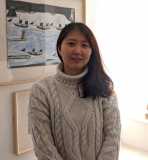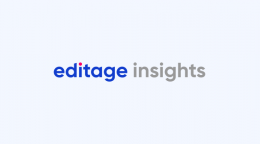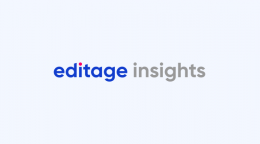Current status of peer review in Korea and suggestions to improve research integrity - Interview with Hyobin Lee, Executive Director of the Korean University Council of Research Ethics

The theme of Peer Review Week 2022 is ‘Research Integrity: Creating and supporting trust in research,’ which offers a valuable opportunity for the global academic community to converse about the ways in which peer review helps maintain and strengthen the research integrity.
We at Editage Insights are discussing the topic of peer review and research integrity with researchers from various regions and backgrounds to celebrate Peer Review Week 2022. As part of this initiative, we had a conversation with Dr. Hyobin Lee, executive director of the Korean University Council of Research Ethics and advisor to the Research Ethics Center, National Research Foundation of Korea (NRF).
Dr. Lee completed her Master's degree in political science at the University of Utah and the University of Texas at Austin, USA, and her doctorate in political diplomacy at Korea University. She currently teaches political science at Chungnam National University's Asia Business International Studies Department. She has co-authored two significant papers on research ethics titled “First Steps to Research Ethics for Early Career Researchers” and “Study on Ethical Standards of Peer Review Related to Academic Research” published by the National Research Foundation of Korea.
In this interview, Dr. Lee shares her perspectives on the current status of peer review in Korea and suggestions to improve research integrity.
Q. Thanks for accepting the interview request, Dr. Hyobin Lee! Although you are busy with your research and lectures, you actively participate in research ethics issues. Last year, you were the first author of the influential paper “A Study on Ethical Standards in Peer Review Related to Academic Research” published by the NRF. I'm curious as to what motivated you to focus on research ethics.
A. As a fact, there are not many people who study research ethics in Korea and there are very few people who write papers. I worked in the policy research team in NRF and had written two papers on issues related to research-funding fraud in 2017. The issues in research ethics were not highlighted much in Korea at that time. But soon after, problems such as predatory journals arose, and I was commissioned to write “Main Characteristics of Predatory Publishing Activities and Preventive Measures” (2019) and I was appointed as an investigator of the predatory publishing activities in Korea. I have been working as an executive director of the Korean University Council of Research Ethics since 2019, expanding the scope of the activities.
Q. The theme of Peer Review Week 2022 is ‘Research Integrity: Creating and supporting trust in research’. Can you share your view on what role does peer review play in maintaining research integrity?
A. Many people think academic papers published in prestigious journals such as Science or Nature would have no problem with research ethics because it is very difficult to publish papers in these journals. However, Dr. Hwang Woo-suk's papers, which caused a worldwide scandal for research misconduct in 2005-2006, were published in Science. In addition, the falsification/fabrication in the papers of Seoul National University professor's papers reported in Retraction Watch was also published in prestigious journals. These papers are all peer reviewed, and this leads people to wonder why ethics issues occur in such well-known journal papers.
In principle, it is true that peer review is a way of ensuring the quality of the paper by having peers examine it, but it is not possible to completely filter out research misconduct. When a reviewer receives a paper, it is common for them to assume that the paper is free of any unethical elements. Sometimes reviewers can identify plagiarism in the paper they are reviewing but it's very difficult to identify fabricated data. Therefore, I would say that the peer review process does not guarantee research integrity.
In fact, there are quite a few cases where research integrity issues arise during peer review process. I've heard and learned from my colleague and retractionwatch.com. My colleague had submitted her paper to a journal, but it was rejected. After a year, similar research was published in another journal and the author of that paper was the reviewer of her rejected paper. There are actually several cases in which reviewers deliberately reject the paper and modify it to publish it under their name. However, it is very difficult to prove these incidents.
Q. As you mentioned, there are cases in which research integrity is threatened in the peer review process – being forced to cite reviewers' research, conflicts of interest issues, issues with review confidentiality, and so on. Do you have any other examples that come to mind?
A. Conflicts of interest are very common. As a general rule, an editor of a journal is recommended not to publish their papers in that journal. However, there are cases where editors submit papers to the journal and assign peer reviewers themselves. This is a typical conflict of interest. As I mentioned before, there also are cases where reviewers plagiarize the research they review. Because journals with a high rejection rate are considered as good journals, one of the journals indexed in KCI (Korea Citation Index) lied as if they had done a review to increase the rejection rate of the papers.
Q. When requesting peer review, do Korean journals provide any guidelines to reviewers about which areas they should focus on (e.g. plagiarism, image manipulation, etc.)?
A. Generally, Korean journals conduct plagiarism check through tools such as Turnitin or Copy Killer (Korean plagiarism inspection software). It varies from journal to journal, but usually if the similarity score is more than 15-20%, the paper gets a desk rejection without a review. Although if the tools help filter plagiarism, it is not easy to identify the other types of research misconducts in manuscripts. To prevent misconduct, some journals request authors to submit the original data set which helps reviewers identify any falsification, but this is only done in some prominent journals.
Even in cases of authorship, there is little scope for reviewers to identify ethical issues. Journals usually require authors to explain the role each co-author played, but reviewers cannot verify this. It is also difficult to identify duplicate publications, such as submitting a paper in English that has been published in Korean.
Q. As you mentioned in the NRF report, human and material resources involved in peer review are enormous[1]. Could you talk about this briefly? Also, could you share your views on the current status of the peer review system in Korea?
A. The NRF (National Research Foundation of Korea, funding agency) is a national research fund institution, so they sometimes pay peer reviewers.
(As far as I understand, generally, reviewers are not paid for peer review, are they?)
That's right. The NRF pays small sum, so it would be relatively easy to find a reviewer. But in the case of most journals, peer reviewers are not paid. Especially, humanities and society journals don't have a lot of money. So, there is no incentive for reviewers.
Now, the peer review process may be slightly different for each field. For instance, I’ve been informed that one of the mathematical sciences journals assign only one reviewer. Papers in the field of mathematics can have clear answers, so it may be possible to get papers reviewed by one person and examine the accuracy of the methods and findings. However, in the case of the humanities and social sciences, the quality of the paper is determined by several point of view. So, for one paper, one reviewer may reject it while the other could recommend publication after revision. Therefore, humanities and social science journals usually assign 2-3 reviewers. These reviewers are required to read the entire article and give detailed comments without any monetary compensation, which is time consuming and effort intensive for reviewers.
Another problem is that the peer review process takes too much time from the perspective of the author who has submitted the paper. In my case, one of the papers I submitted to an SCI journal is currently in the resubmission status after revision. It took 6 months to get the first review which is a relatively short period of time; sometimes, the review process takes a year or more. So long as you don't get a rejection in the end, that's fine. If your paper gets rejected, you have to submit it to another journal and wait a long time again. The researchers may start writing another paper while waiting for the result of the submitted one experiencing fear and hopeless about the fate of the new paper. That happens a lot.
We should think about why researchers keep publishing papers in predatory journals – the results come out quickly, within a month. From a researcher's point of view, a month and six months are a huge difference considering their age and career. Journals should consider this problem and make efforts to resolve the challenges researchers facing during the review process.
Q. I’ve heard that Korean researchers face the pressure to produce more papers, so it’s quantity over quality of research performance. Therefore, it would be more burdensome for them if the review and publishing process takes a long time. Is that why the problem of research misconduct in Korea is getting worse?
A. According to the “Study on Research Ethics Awareness Level of University Faculty” (NRF, 2021), which I co-authored, we tried to understand “Why do you think research misconduct constantly occurs?” and the most participants responded that it was “quantitative-oriented evaluation method”( 36.9%, 845 out of 2,292 respondents)[2]. Because of this evaluation method, researchers are chasing the performance, leading to research misconduct and problems with predatory journal publishing. So, the question is should the researchers be blame for this? In China and the US, even if a researcher doesn’t have a desirable number of publications, they are often hired based on their doctoral dissertation. This is impossible in Korea. Therefore, Korean researchers are trying to fill the number of research achievements quantitatively.
Q. The Korean academic community should try to make some changes to resolve this situation. Returning to the topic of peer review, various attempts are being made to address problems in the peer review process. Can you share some examples of this?
A. Authors host papers on preprint servers before they are published in journals and this enables readers to point out any concerns around misconduct. Also, there is a site called pubpeer.com that enables researchers to search for their publications or their peers’ publications and provide feedback and/or start a conversation anonymously. Some journals like F1000RESEARCH conduct post-publication review which allow peer review to be conducted after publication where readers review research after it is published. Peer review can be done in a variety of ways. These attempts are very novel, and I think it is necessary to actively consider them in Korean academia.
Q. What advice would you like to give to Korean researchers, editors, and publishers on how to improve the peer review process and better address research and publishing ethics violations?
A. In Korea, when granting research funds, single-blind peer review is performed – the author's name is revealed and the reviewer's name is hidden. There are a lot of cases in which research funding is allocated by only looking at the researcher's profile without reading the grant proposal. I think this is very problematic.
Also, I want to point out that there is hardly any room for failure in Korean academia. In the case of the US, a lot of money has been poured into dementia research, but dementia has not been conquered yet. Even after many failures, they continue to support and fund this research area. As a result, the possibility that the US would one day cure dementia is definitely higher than that of other countries. We, Korean academia, should be given opportunities to keep working on challenging areas of research. The research funding institutions in Korea should invest a fixed amount of funds in research areas that have a high risk of failure, but are still valuable for our society.
Also, a peer review should be based only on the merit of the research proposals. I would like to suggest extending the double-blind peer review system in the research funding process, instead of the single- blind method that exposes the author's identity.
Additionally, I would like to talk about the evaluation and hiring system in Korean academia. Universities in the US fill various professor and tenure-track positions - For example, if you are good at lecturing, then you are recruited for lectures only, and if you excel in research, then you are hired as a professor who focuses only on research. I would like to see more diverse evaluation methods and manpower allocation in Korean academia. It's necessary to make an effort to use manpower in a more diverse way.
Q. Lastly, can you tell me what issues you are focusing on recently regarding research ethics?
A. I am working a couple of projects like a follow-up study on last year’s peer review report by NRF. Whereas the previous report focused on peer review by research funding institutions, the follow-up paper is an expansion of the scope as it will cover the peer review system in Korea holistically. Another paper I am working on concerns the problems in peer review in basic research and how to change evaluation indicators.
In addition to the NRF papers, I am also conducting research on critical research ethics issues and I am working on a research ethics guide for foreign researchers working in Korea. Although the research was completed, the revision of the Guidelines for Securing Research Ethics was announced in February of this year, so the publication is withheld to reflect this revision. Another paper I am working on and will be published soon is about conflict of interest. The Conflict of Interest Prevention Act came into effect on May 19 of this year, and there is a need to address this issue in academia as well. Apart from this, I am also working on research papers on research ethics. But there are few journals dealing with this topic in earnest in Korea, so I need to explore journals to submit them to.
Thank you, Dr. Hyobin Lee for sharing in-depth view on the current status of peer review in Korea and discussion to understand the Korean researchers’ challenges they face. Do you have questions or comments about the interview, or something you would like to share about peer review and research integrity issues? Please share in the comments section below!
[1] Although there are no survey results on how much time on average Korean researchers invest in reviewing research, some extent, it can be estimated by analyzing the status of peer review conducted by the National Research Foundation of Korea. (…) In 2019, 8,710 evaluation panels were formed for the project evaluation of the National Research Foundation of Korea, and the number of participants was 35,572 including duplicate participation. if this is converted into the evaluation participation time, it is estimated that about 280 years were invested in 2019 alone. (NRF, 2021, p8]
[2] As the cause of the failure to eradicate violations of research ethics, 36.9% of university faculties (845 out of 2,292 respondents) recognized that it was ‘performance-oriented evaluation system and fierce competition among researchers’. The second cause was 'economic benefits such as obtaining research funds (19.9%)', and the third reason was 'a lack of capacity and will to detect and verify research misconduct or research inappropriate conduct’ (11.2%). (NRF, 2021, P20)
Comments
You're looking to give wings to your academic career and publication journey. We like that!
Why don't we give you complete access! Create a free account and get unlimited access to all resources & a vibrant researcher community.

Subscribe to Journal Submission & Peer Review













